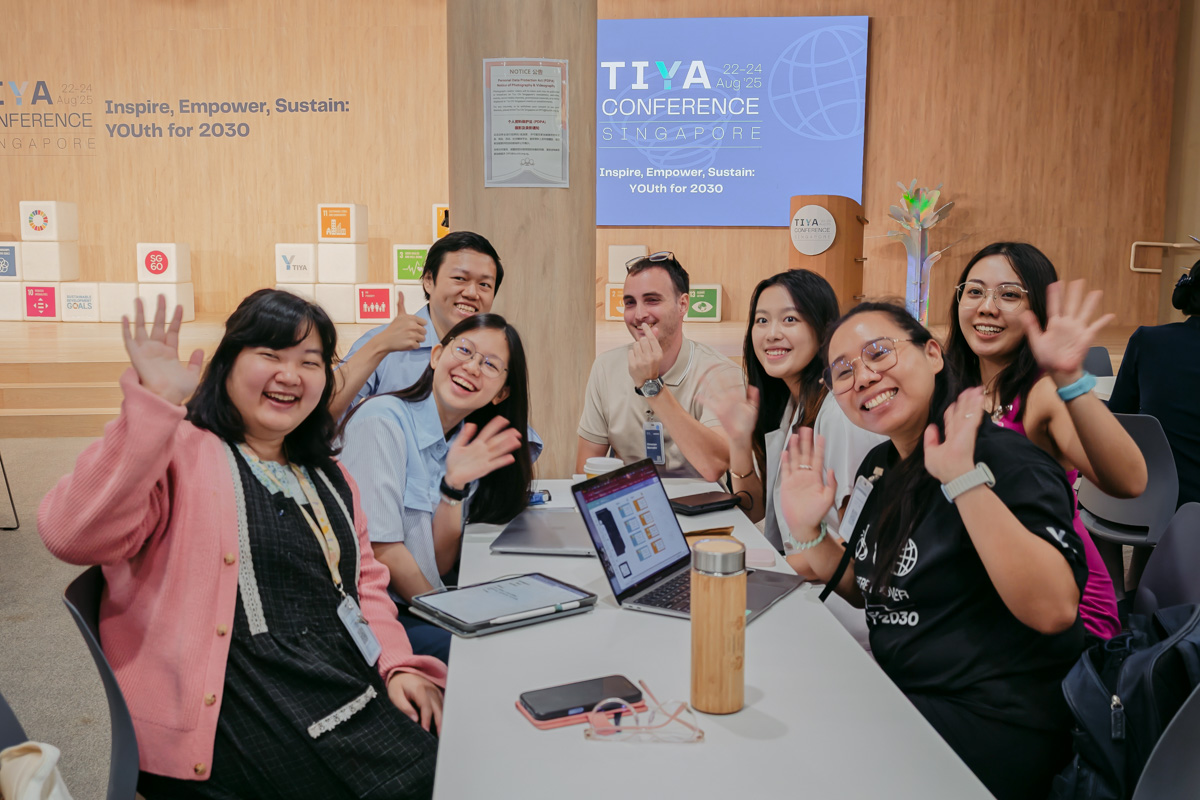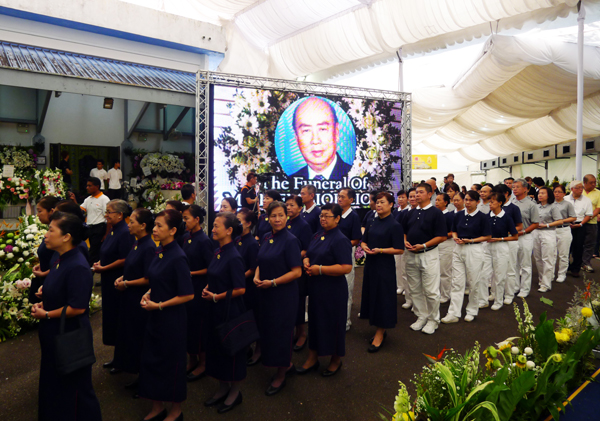The session went underway with a video recap of Tzu Chi’s accomplished missions through the four seasons last year. Never a moment behind, as the video showed, the volunteers in blue and grey would spring into action to provide aid and relief whenever a disaster struck.
These missions, inspired by Master Cheng Yen’s ideology, have touched and healed not only the physical body of the disaster victims, but most importantly their hearts as well. Though among the trainees there were people who came from different races and religions, they would have found out after watching the video that all are equally treasured and respected in the eyes of the global Tzu Chi family. Around the world, volunteers from different backgrounds worked hand in hand and heart to heart to relieve the suffering all year round.
Following which, Brother Khoo Jyh Hao went on stage to share with all on the highly documented disaster in Japan. A clip extracted from the famous disaster movie, 2012, was played to show the resemblance of the disaster that struck Japan in real life. Looking at the scale of these disasters that have happened, it is hard to not be convinced that our Mother Earth is really sending out calls of distress with increasing urgency each time.
Brother Khoo proceeded to relate the cause of these disasters to the law of cause and effect, which many in society are still turning a blind eye to. Some might even think it’s a superstitious religious belief. For instance, many of us still cannot understand the supply-demand chain between industries and consumers; and how meat is causing substantial industrial pollution to our environment. Due to this “cause” (demand for meat), the livestock industries carries out deforestations in order to make space for factories to rear consumer’s “table meat”. This in turn produces the “effect” brought about from deforestation, that is, infertile land, disruption of the water cycle, flooding, and drought, as trees play a big part in regulating the flow of water from rain. Furthermore, animal waste and gases are also contributing to the pollution of our environment.
From the above, we can find that there are scientific relations in the Buddha’s teachings and the Master’s advice to sustaining our environment. Adopting a vegetarian diet is no longer a religious practice as it helps to lessen the burden of the planet and the cause of environmental pollution.
As vegetarianism is commonly practiced by most Tzu Chi volunteers, Brother Lee Kong Meng took the opportunity to share about his route to becoming a full-time vegetarian. For someone who used to be in a senior position in a marketing firm before his retirement, he had had much exposure to meaty meals in restaurants. Being an avid animal/pets lover, he thought to himself one day: why not I extend this love to all in the animal kingdom instead of confining it to my pets.
Brother Lee went on to make up his mind in going on a full-time vegetarian diet in a “cold turkey” fashion. At the age of 68 and being a vegetarian for one and a half years, Brother Lee’s appearance shows that he is in the pink of health. His previous health-related worries of going green were proved to be just misconceptions. To further illustrate this point, Brother Lee demonstrated a couple of hops to emphasise his message in a light-hearted manner.
The following speaker, Dr Edwin Lim, whom will soon join Tzu Chi Singapore’s Free Health Screening Centre as its first full-time doctor, went on stage to share his encounters in Tzu Chi after he started as a volunteer in its medical wing, TIMA (Tzu Chi International Medical Association), at his wife’s recommendation.
Being a Christian, Dr Edwin showed and touched many fellow volunteers with his admirable acceptance towards working in his interfaith collaboration with Tzu Chi. Sharing the same ideal as fellow non-Buddhist volunteers worldwide in the Tzu Chi family, it was the “Great Love” concept which led him to becoming part of the big family.
On top of that, as a medical practitioner, he believes in preventive medicine, and he finds that volunteering in Tzu Chi is also a form of way to cultivate better mental and physical well being, as "those with a positive belief has a stronger footing in facing and coping with illnesses".
After the sharing on stage, in his interview, Dr Edwin mentioned that despite leading a tiring and hectic work life, he finds pleasure and reward after each volunteering experience, and it is indeed the satisfaction that keeps him going on. He finds that he has gained a lot from the well-structured programmes of the training session, which allowed him to have a more in-depth knowledge about Tzu Chi’s spirit and teachings.
Apart from Dr Edwin’s interview, our media volunteers caught up with some of the trainees to share their thoughts on the training session.
Seny Surani remarked that she got to know of Tzu Chi through Da Ai TV back in her native Indonesia, and she located the local Tzu Chi branch through our volunteers in Singapore during the islandwide street fundraising event for Japan disaster relief. It was from there that she took the initiative to find out more about Tzu Chi Singapore through attending the English training session. She was very happy indeed to have attended the training as she got to know more about what Tzu Chi does as a whole and is very interested in finding out more. Lastly, Seny mentioned that she is keen to take part in Tzu Chi’s social work, and with that, she is assured that this big family from the Singapore branch will welcome her with open arms.
Many years back when the local Tzu Chi branch office was located in Chinatown, Jasmine got to know about the Foundation but have not been able to find a chance to know more. She regrets that it took her so many years to eventually join us. Jasmine finds the session fruitful in helping her to look at things from a different yet positive perspective, and hopes to influence her family members to get involved in Tzu Chi's cause.
The Seeds of Hope project, an initiative which brings relief to both parents and students who were affected by the financial crisis back in 2008, continues till today and is still reaching out to students who come from the lower income group. From this project, Vani got acquainted with Tzu Chi and its volunteers and was introduced to the Redhill recycling point where she frequently volunteers at nowadays.
Also her first time attending Tzu Chi’s training session, the Indian trainee recounted that she couldn’t have made it to the session if not for the extra effort taken to finish up her household chores. As shared by Vani, the positive ambience has enabled her to feel closer and more loving towards all living beings as the videos seen in the session opened up her perspective on the suffering felt by fellow beings around the world. Animals inclusive, she felt, should be treated and loved equally like human beings as they too have feelings.
Speaking of which, being a non-uniformed volunteer who just got to know more about Tzu Chi in a span of two days, Raymond Koh who attended the recycling volunteers' get-together just a day before the English training session, made a pledge to decrease his meat intake as his first step towards caring for the innocent animals.
Though his nature of work involves the trading of processed livestock, Raymond is determined to lessen his meat intake and also to participate in charity work. Apart from this, the Singaporean expressed his willingness to join the ranks of Tzu Chi volunteers by fulfilling the criteria of being a uniformed volunteer. At the age of 40, he felt that the participation in these two days’ programme at Tzu Chi will be the turning point in his life, as all these years he recounts not having spent any time in carrying out meaningful deeds.
As the training session came to an end, it marked the beginning for many soon-to-be Tzu Chi volunteers.
Seny Surani (right) from Indonesia bumped into our fundraising team on Orchard Road two weeks ago and here she is attending her first training session with Tzu Chi.
Dr Edwin Lim sharing his medical outreach experience with Tzu Chi with the fellow trainees.
Though his nature of work involves the trading of processed livestock, Raymond is determined to lessen his meat intake and also to get involved in charity work.
Among the trainees were more than ten medical personnel from TIMA Singapore in their distinctive white polo shirt.
Vani learning Tzu Chi's sign language from the volunteers.



